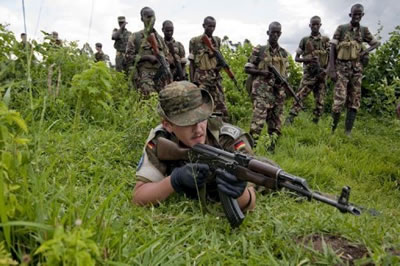
A German soldier (C) instructs Somali government soldiers -AFP
 | ||
| Somali government soldiers run formation drills during a training course | ||
BIHANGA MILITARY BASE, Uganda — Somalia's fledgling army faces countless hurdles before it can claim to control its territory but the most immediate obstacle is understanding what the instructors are saying.On the second day of a one-year programme by the European Union to train Somali soldiers, both sides were still finding their feet.A Spanish instructor shouted orders in broken English to his assistant, a Ugandan officer, who relayed the message in Swahili to a Kenyan translator who in turn translated it into Somali to get through to the trainees. "I want them like this, facing like this. You understand?" was the command by the officer to have the trainees run in a tighter formation.A batch of 76 Somali government soldiers were the first in the training financed by the EU to the tune of five million euros (6.2 million dollars) and involving 150 military trainers from 14 EU states.The programme targets 2,000 Somalis to form a professional army to protect Somalia's Transitional Federal Government faced with a deadly Islamist insurgency in the lawless country's capital Mogadishu."The only problem we are having so far is language," said Warrant Officer Milton Opoka, one of the Ugandan trainers. Mission commander Colonel Ricardo Gonzalez Elul of the Spanish army however voiced optimism at the latest effort by the international community to prop up the embattled Somali government."(These) new trained troops will have, I think, the capacity and capability to fight against the insurgents in Mogadishu," Elul said.Uganda, which has deployed troops to Somalia for the African Union peace force, is hosting the exercise because it will spearhead the repatriation and integration of the trained Somali troops. But Uganda's military also knows that withdrawing its peacekeepers will be easier if the Somali government is able to defend itself."We believe that we have to assist the Transitional Federal Government... to take charge of their own security because we do not foresee (our) forces staying forever," Uganda's army spokesman Felix Kulayigye said at the training base. As Spanish, German, Hungarian, French and Irish soldiers conducted drills, one Somali trainee said he was grateful for the help."This training is very good. It is (more) special than other training," said 28-year-old Abdullahi Ibrahim Aden.However, neither the European nor Ugandan military officials are certain that their students will remain loyal to a embattled government that currently controls only a patch of Mogadishu.Aden, whose familly lives in a region held by Al Qaeda-linked Shebab militia, insisted that loyalty can only be guaranteed if the government pays its troops fairly and on time."If they are paid, people will stay and believe in what they are doing without fearing," he said, explained that the promise of money is the Shebab's most effective recruitment technique.Elul, the mission commander, made the same plea. "For the Transitional Federal Government, it will be easier to keep all the trained troops together as long as they can succeed in paying their salaries."While Ugandans are responsible for much of the basic training, the EU is focusing on identifying tactics to equip Somalia's army with junior officers drilled in special skills like mine detection and close combat in crowded urban areas.On-field training only started on Monday, but one Hungarian soldier said things were going better than predicted."They look very skinny and weak, but actually they are very strong," First Lieutenant Csaba Horvath told AFP. "They are more professional than we expected." He expressed confidence his students were taking their lessons seriously. "I think they will remember everything," he said. "They have to, because basically their life depends on the knowledge we are teaching them."Aden confirmed that both he and his fellow trainees are paying close attention to the lessons, largely because the stakes are so high. "Somali children, women, all grandfathers, grandmothers... every day they are dying in the streets of Mogadishu. That's why I came to be a volunteer. To change what's happening in the country. That's why I'm here," he said. | ||



.jpg)












No comments:
Post a Comment